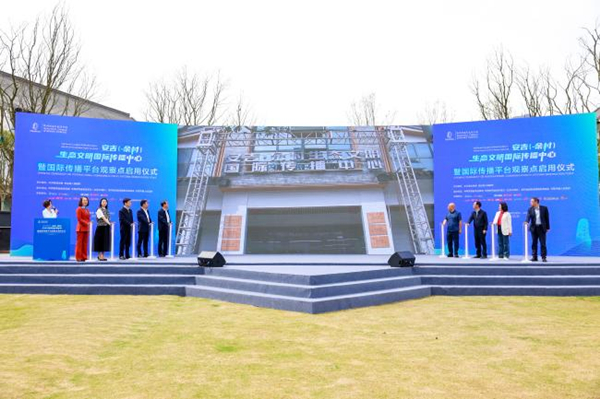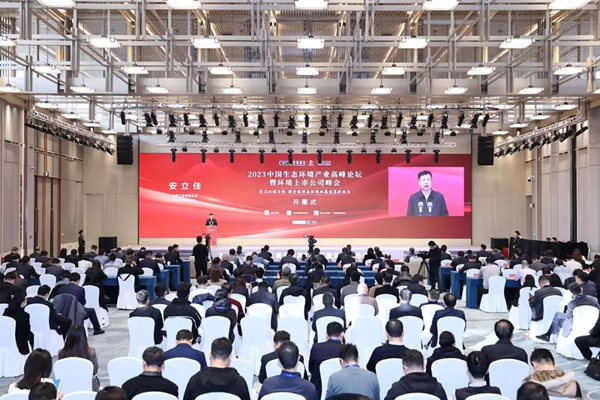A wave of prosperity
Water, she adds, made the Taihu area habitable, and one of the most prosperous regions in China. But due to the large population and advanced industry, water pollution from adjacent industrial sites saw locals join the ranks of the first Chinese people who took the lead in pushing for measures to protect the environment.
Although the beautiful scenery and tasty food of Taihu region left a deep impression, it was the people who live in the area that really impressed Liu, with their diligence, toughness, wisdom and pioneering spirit.
She remembers Pan Chunlin, who used to work as a tractor driver for a limestone quarry in Yucun village, Zhejiang's Anji county. At that time, Anji was benefiting economically from the limestone industry, but the quarries were closed to protect the environment in 2001. Losing his job, Pan took out a loan and opened a homestay.
Although there were few customers at first, when the local environment improved, Pan's homestay became popular. Then more local people followed suit, opening homestays of their own, and Pan established a homestay association to make the business more organized.
"Local people can recognize direction of future development, and insist on their cause in spite of the difficulties they may meet. Their toughness and spirit of exploration moved me very much," says Liu.
President Xi Jinping, in 2005, then secretary of the Zhejiang Provincial Committee of the Communist Party of China, commended Anji's efforts to protect the environment and proposed the concept that "lucid waters and lush mountains are invaluable assets" when he visited the county. It would go on to become an important guideline for ongoing development in China.
From Liu's perspective, it's not a coincidence that the people around the lake were the first to hear Xi's concept, and to enjoy the benefits of ecological protection. "Since they were among the first to suffer from environmental deterioration, they had to be one of the first groups of people to change the path of their region's development. And it was the quality of character among the local people that ensured they could reap the rewards of the changes," says Liu.
"The people are hardworking and wise enough to create a better hometown for themselves," says Chen Lin, one of the directors of the documentary, adding that as the water quality has improved, their lives have entered a happy new stage.
Chen is impressed by the story of Yao Jianping, a master of suxiu, or Su embroidery, a national-level intangible cultural heritage originating in Suzhou, Jiangsu province, who was also featured in the documentary.
Yao has strived to become a master of the craft, which she began learning as a child. In 1990, not long after her child was born, she went to live in the home of her teacher to improve her skills. For four years, she only went back home one day a month, and studied the craft from day to night.
The hard work paid off. Yao has become a national-level inheritor of Su embroidery, and many of her works have been presented as national gifts to leaders from other countries. She still embroiders for over four hours every day to maintain her touch and skill.
"When I embroider the tail of a fish," says Yao in the documentary, "I need to split a thread into 352 parts, and use only one of them so that the tail can become graceful and vivid just like a real fish swimming in the water. That is the extreme beauty we strive to show in Su embroidery."
"The image of a woman from the Jiangnan region became specific in my heart after I interacted with Yao," says Chen. "She seems to be gentle and calm, but her persistence with Su embroidery is firm. I can see the pure love for her cause."
Crew members spent two years walking around the lake preparing for, and filming, the documentary. "I hoped to make a documentary related to the Jiangnan region for many years, and the dream has finally come true," says Liu.
"By making this series, I gained a deeper understanding of the region, especially how it was formed with the effort of generations of local people, and my affection for the place grew even greater."
The work is a companion to The Yangtze River, another documentary which describes this mother river, from its source in Northwest China's Qinghai province to its estuary in Shanghai. The documentary has been broadcast overseas and won a prize at the Chinese American Television Festival held in Los Angeles last year.
"Ecological protection is related to the sustainable development of China," says Wang Lijun, director of the documentary center of Shanghai Media Group. "The production is the start of a series of other works related to the environment and ecology that we will promote this year."





